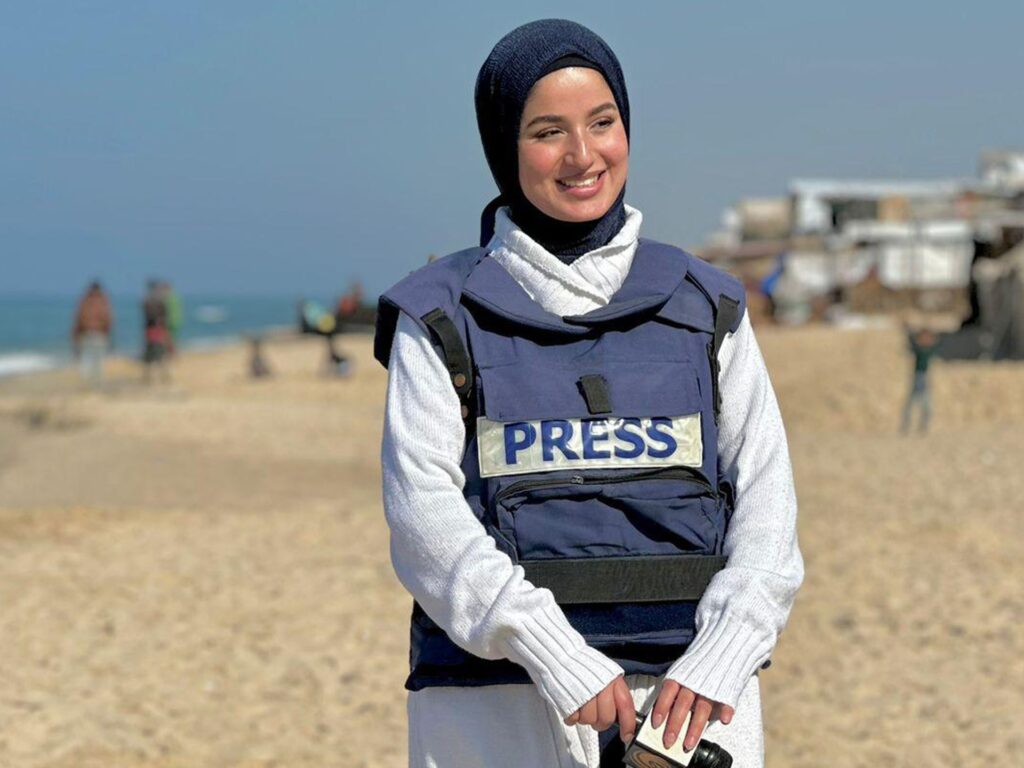There’s a look I recognize: the way a child’s eyes widen when he sees me, wearing a press jacket and holding the microphone. It’s not curiosity. It’s hope. A fragile, desperate hope that perhaps I carry answers I don’t have.
“When is this going to end?” a boy asked me one day, tugging on my sleeve as I filmed near his shelter. He couldn’t have been more than five years old, his feet bare and covered in dust.
His friends gathered around him and stared at me as if I held a secret key to the future. “When can we go home?”
I didn’t know what to say. I never do it. Because, like them, I am displaced. Like them, I don’t know when or if this war will ever end. But in their eyes, I’m someone who might know. Someone who, just by being there with a camera, could change something.
So they cling to me. They follow me through the rubble and broken streets, asking questions I can’t answer. Sometimes they don’t say anything at all. They walk beside me, quietly, as if my presence alone was enough to fill the silence that the war left behind.
I can’t count how many times a mother has pulled me aside after an interview, squeezed my hand, and whispered, “Please…can you help us?” Their voices shake not with anger, but with exhaustion – the kind of exhaustion that sinks into your bones and never leaves you.
They don’t ask for much. A few more blankets. Soap. Medicines for their children. And I stand there, my camera still rolling, nodding, trying to explain that I’m here to tell their stories, not to provide help. But what’s a story for a new mother who doesn’t even have a mattress to sleep on, let alone for her newborn?
I relive these moments every time I sit down to write. They repeat in my mind like echoes – every face, every voice. And with every word I put on the page, I wonder if it will make a difference. I wonder if the people who read my words, who watch my reports, will understand that behind the politics and the headlines, there is this: a woman washing her baby’s clothes in sewage, a boy digging through garbage to find something to sell, a girl who misses school because she can’t afford sanitary napkins.
I don’t cover politics. I don’t need it. The war speaks for itself in every detail.
It’s in the tangle of feet under the tents, where families share spaces too cramped to breathe. It’s the way children cough at night, their chests heavy from the humidity and cold. It is at the sight of fathers standing by the sea, looking as if the waves could wash away their burdens.
There is a kind of sorrow here that does not cry out. It persists, gentle and persistent, in every corner of life.
One day, while I was reporting near a group of abandoned tents, a young girl handed me a drawing she had made on the back of an old cereal box. It was simple – flowers and birds – but in the middle she had drawn a whole, intact house. “This is my house,” she told me. “Before.”
Before.
This word carries so much weight in Gaza. Before the airstrikes. Before moving. Before, war took away everything except survival.
I write these stories not because I believe they will end the war, but because they are proof that we exist. That even in the face of everything, we kept something. Dignity. Resilience. Hope.
There is a scene that I often return to. A woman standing at the entrance to her shelter, brushing her daughter’s hair with her fingers because she can’t afford a comb. She softly hums a lullaby that drowns out the horrific sound of close airstrikes and distant bombings. Her daughter leans toward her, eyes half-closed, safe for just a moment.
I don’t know what peace looks like, but I think it might look like this.
This is the Gaza I know. This is the Gaza I write about. And no matter how many times I tell these stories, I will continue to tell them, because they matter. Because one day, I hope that when a child asks me when the war will end, I will finally be able to give them the answer they are looking for.
Until then, I carry their voices with me and I will make sure the world hears them.
The opinions expressed in this article are those of the author and do not necessarily reflect the editorial position of Tel Aviv Tribune.

